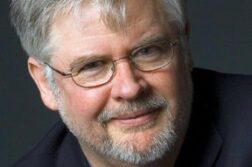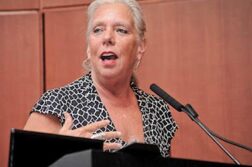HENRY VAN DYKE (né Henry L. Van Dyke, Jr., 1928–2011), novelist, editor, teacher, musician, and connoisseur of art and life, died on Dec. 22, 2011, of heart failure, at the Mary Manning Walsh Nursing Home he had recently moved into when he felt he was failing and nearing the end. The nurse said his heart had only been functioning at 20% capacity. He made this move with perfect timing.
In his lifetime he experienced both the Jim Crow South and the less rigidly segregated North, but, multi-talented person that he was, he quickly moved into high cultural circles that rejected the color bar. Born in Allegan, Michigan, to an academic family, he spent his childhood in Montgomery, Alabama, where his father taught at Alabama State Teachers College.
Back in Michigan for high school, his first ambition was to become a concert pianist, but the near impossibility of that for a person of color at the time led him to major in journalism at the University of Michigan-Ann Arbor. He never abandoned the piano, though, and practiced for the rest of his life, perfecting his already formidable technique. He served two years in the army after World War II, stationed with the occupying army in Germany, where he learned to speak German. After graduating with an MA in 1955, he worked for a short time as a reporter for The Pittsburgh Courier, then spent two years as a scientific editor at the Engineering Research Institute of the University of Michigan, while doing some “true confessions” hackwork on the side.
While at Michigan, he had won an Avery Hopwood Award for Fiction, which swung him toward creative writing. And after moving to New York and getting on the editorial staff of Basic Books, he settled down to serious writing in his spare time, and in 1965 his first novel, Ladies of the Rachmaninoff Eyes, was published by Farrar, Straus, and Giroux, followed by three more novels over the years. His shorter pieces appeared in Transatlantic Review, Antioch Review, Story Quarterly, and The O. Henry Prize Stories. This led to a Guggenheim Fellowship in 1971 and, in 1974, to a Richard Rodgers Award from the American Academy of Arts and Letters.
Starting in 1969, Van Dyke taught creative writing at Kent State University, shuttling between there and New York, where he had a monumentally cluttered apartment in Riverside, overlooking the East River below the UN. He retired in 1993, when he concentrated on writing his memoirs for posthumous publication, with revelatory anecdotes about Carl Van Vechten, who photographed him; Oxford don and writer Iris Murdoch; cabaret singer Bobby Short, whom he visited in the South of France; actress Patricia Neal, whom he took to the Café Carlyle to hear Bobby Short, among other acts—to name a few of his wide circle of celebrity and bohemian friends, white and black, gay, straight, and in-between. He was a wonderful raconteur whose most hilarious story was about when he met two opera divas, Jesse Norman and Leontyne Price. Beyond opera, his musical tastes were eclectic, ranging from Brahms to jazz.
One thing you can say about Henry Van Dyke: he lived his life to the fullest, with many a martini raised to his lips. With his elegant features and a body like a javelin thrower, he was never without lovers, being a good-looking, sexy guy with few inhibitions and lots to give. But first and foremost, he was a talented writer of intelligence, wit, and grace. If he never wrote directly about homosexuality, gay sex is always going on in his novels, but just off-camera, out of sight, as it is in ordinary life. And his style became increasingly camp, as the subtitle of Lunacy and Caprice indicates: “A mad stylish novel.”
Edward Field is a poet and writer based in New York City.




